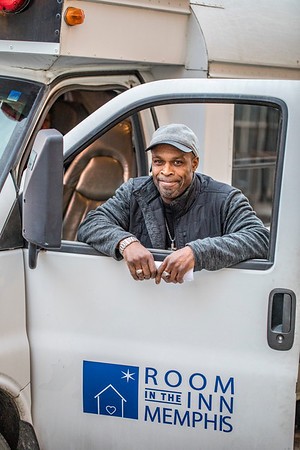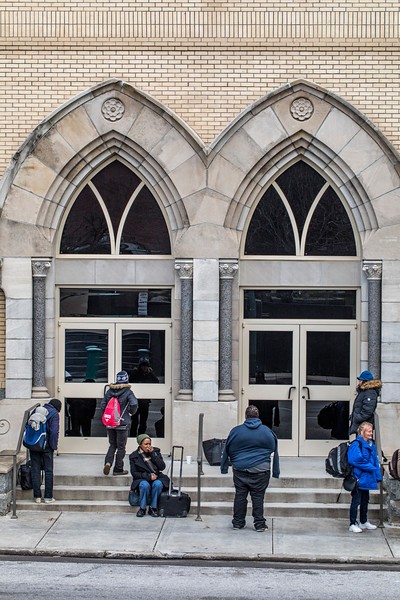 Justin Fox Burks
Justin Fox Burks
Room In The Inn ended its 2019/2020 season early due to coronavirus.
One of the few shelters for homeless women in Memphis had to shut its doors last week due to the spread of COVID-19 in the community.
Room In The Inn, which places homeless individuals at churches across the city for the night and provides them with a meal and a place to sleep, and sometimes access to showers and clothes closets, ended its 2019/2020 season early.
The shelter, which seeks to accommodate women first, is typically open from November through March, but Monday, March 16th, was its last day of operation this year, Lisa Anderson, executive director of RITI, said.
“Even with all of the extra precautions, the suggested compliance is that we practice social distancing and avoid gatherings in groups, especially in vulnerable populations,” Anderson said. “RITI guests are in this group. Also, many of our volunteers are in age groups and health groups that are at risk.”
The night after RITI shut its doors, First Presbyterian Church opened its doors to operate a temporary emergency shelter for women at the request of the Hospitality Hub. Since Tuesday, the church has had about 20 guests each night.
Kori Phillips McMurtry, pastor of First Presbyterian, said “it’s hard to say what ‘stay at home’ means for people without homes. But we are doing what we can while trying to meet the need of this vulnerable population whose safety net and services are shifting dramatically and disappearing day by day.”
Phillips McMurty said the church is working with others in the community to develop a more sustainable shelter option during the COVID-19 outbreak. In the meantime, at First Presbyterian’s shelter, Phillips McMurtry said staff has been following health official’s recommendations about handwashing, spacing beds six feet apart, and preparing food with the “utmost cleanliness.”
[pullquote-1]
A concern of Phillips McMurtry is that it is becoming more difficult for homeless individuals to find meals. The church served over 250 people on Sunday and this is twice as many people as the church usually serves at its weekly soup kitchen, she said.
The Memphis Mission Union, a reliable source of meals for the homeless, serves over 313,000 breakfasts, lunches, and dinners each year. But now, the agency has had to limit its meals only to those who are registered guests of the shelter, drastically reducing the number of people served a day.
However, the Mission’s men’s shelter remains open and the agency said it is taking precautionary measures, “knowing that our homeless clients may suffer from a variety of chronic and acute conditions that may affect their immune system response.”
The agency is following the coronavirus infection prevention plan guidelines laid out by the Citygate Network, a group of organizations that provide resources and education to agencies working with vulnerable populations. The plan includes guidelines on disinfection, sanitation, and isolation of sick individuals.
The Hospitality Hub, which is located in Downtown Memphis and provides a range of services to homeless individuals, remains open, but is operating with a “skeleton crew,” said Kelcey Johnson, executive director of the Hub.
Johnson said the Hub’s office will remain open to provide essential services. Intake and counseling services have been suspended to reduce social interaction, but visitors still have access to their personal lockers, restrooms, coffee, and mail.
Dan Springer, deputy director of media affairs for the mayor’s office said the city is “actively coordinating” with the county, the Hub, Community Alliance for the Homeless, and other agencies to monitor the capacity and needs of shelters in the city.
He advises people who are experiencing homelessness to contact the Metropolitan Inter-Faith Association’s hotline at 901-529-4545 for shelter alternatives.
A recently published study from researchers at University of Pennsylvania, UCLA, and Boston University found that homeless individuals who contract COVID-19, are twice as likely to need hospitalization, two to four times as likely to need critical care, and two to three times more likely to die compared to the general population.
The study also predicts the number of additional shelter beds each county in the country will need based on the estimated number of homeless individuals there. In Shelby County, there would need to be 433 additional shelter beds, which would cost just over $13 million.
The study explains the need for additional beds this way: “A cornerstone of the strategy for reducing the infection and transmission rates among the homeless population is to find immediate shelter for those living unsheltered and incorporate social distancing — of approximately 100 square feet per person — into existing emergency shelters. To impose social distancing within shelters and transitional housing, we assume a 50 percent reduction in current density.”
Read more from the study here.
 Justin Fox Burks
Justin Fox Burks